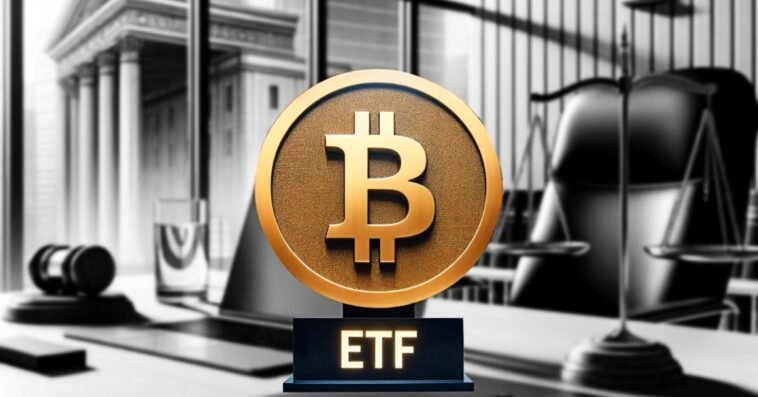Introduction
In recent months, the cryptocurrency market has witnessed remarkable developments, particularly in the realm of Bitcoin ETFs. The surge in net inflows, which has now reached $250 million, underscores a growing confidence among investors.
This growth can be closely linked to broader economic signals, especially those emanating from the annual Jackson Hole Economic Symposium. Jackson Hole’s importance in the global economic landscape cannot be overstated, as it often serves as a bellwether for central bank policies worldwide. The recent signals from Jackson Hole regarding potential rate cuts have had a profound impact on various asset classes, including Bitcoin ETFs.
In this post, we’ll explore how Jackson Hole’s rate cut signal has influenced the surge in Bitcoin ETF inflows, and what this means for the future of cryptocurrency investments.

The Rise of Bitcoin ETFs
Understanding Bitcoin ETFs
Bitcoin ETFs, or exchange-traded funds, have become a popular financial instrument that allows investors to gain exposure to Bitcoin without directly purchasing the cryptocurrency. These ETFs track the price of Bitcoin and can be traded on traditional stock exchanges, making them accessible to a broader audience. The surge in Bitcoin ETF inflows is a significant indicator of the increasing institutional and retail interest in Bitcoin as an asset class.
The Recent $250 Million Net Inflow
In 2024, Bitcoin ETFs experienced a notable surge in net inflows, totaling $250 million. This influx of capital suggests a growing confidence in the cryptocurrency market, driven by various factors, including economic signals from Jackson Hole’s annual symposium.
The large inflow of funds into Bitcoin ETFs is a testament to the shifting sentiment among investors, who are increasingly viewing Bitcoin as a hedge against traditional financial market uncertainties.
Factors Driving the Inflow
Several factors contribute to the rise in Bitcoin ETF inflows. The most prominent among these is the growing acceptance of Bitcoin as a legitimate asset class by institutional investors. Additionally, the broader adoption of cryptocurrencies in various sectors, coupled with the rising inflationary pressures globally, has pushed more investors towards Bitcoin ETFs as a hedge against potential economic downturns.
Jackson Hole’s Economic Significance
The Role of Jackson Hole in Global Finance
The Jackson Hole Economic Symposium, hosted annually by the Federal Reserve Bank of Kansas City, is a pivotal event in global finance. Central bankers, finance ministers, economists, and market participants gather at this symposium to discuss monetary policies, economic outlooks, and strategies for managing economic challenges. The statements and discussions held during Jackson Hole often have significant implications for global financial markets.
The Recent Rate Cut Signal from Jackson Hole
In 2024, the Jackson Hole symposium sent out strong signals of an impending rate cut by the Federal Reserve. This potential easing of monetary policy was interpreted by many as a response to slowing economic growth and rising recessionary fears. The rate cut signal was seen as a move to stimulate economic activity, which, in turn, had a direct impact on various asset classes, including Bitcoin ETFs.
How Jackson Hole’s Signal Affects Bitcoin ETFs
The prospect of a rate cut typically leads to lower yields on traditional assets like bonds, driving investors to seek higher returns elsewhere. This environment often benefits riskier assets such as equities and cryptocurrencies. The signal from Jackson Hole led to a shift in investor sentiment, with many turning to Bitcoin ETFs as a potential beneficiary of the anticipated looser monetary policy. This shift has been a key driver behind the $250 million surge in net inflows into Bitcoin ETFs.
The Relationship Between Interest Rates and Bitcoin
How Interest Rates Influence Asset Allocation
Interest rates play a crucial role in asset allocation decisions. Lower interest rates reduce the appeal of fixed-income investments, prompting investors to seek higher returns in equities and alternative assets like Bitcoin.
The signal from Jackson Hole indicating a possible rate cut has encouraged investors to diversify their portfolios by including more Bitcoin ETFs, which are seen as a hedge against inflation and currency devaluation.
Bitcoin as a Hedge Against Inflation
Bitcoin has long been touted as “digital gold,” a store of value that can protect against inflation. As central banks worldwide continue to navigate the challenges of rising inflation, many investors are increasingly turning to Bitcoin as a hedge. The rate cut signal from Jackson Hole has reinforced this trend, driving more inflows into Bitcoin ETFs as investors seek protection from potential currency depreciation.
The Impact on Institutional Investment
Institutional investors have been gradually increasing their exposure to Bitcoin, and the signals from Jackson Hole have accelerated this trend. With the potential for lower interest rates, institutions are looking to diversify their portfolios with assets that can offer higher returns. Bitcoin ETFs provide an attractive option, offering exposure to Bitcoin without the complexities of direct ownership, thus driving the surge in inflows.
Future Outlook for Bitcoin ETFs
Potential Regulatory Developments
As Bitcoin ETFs gain traction, regulatory scrutiny is likely to increase. The rapid growth of these financial instruments may prompt regulators to implement stricter guidelines to ensure market stability and investor protection. However, regulatory clarity could also boost confidence in Bitcoin ETFs, leading to further inflows.
Long-Term Implications of Jackson Hole’s Signals
The signals from Jackson Hole suggest that we may be entering a period of prolonged monetary easing. This environment could be favorable for Bitcoin ETFs, as investors continue to seek assets that can offer protection against inflation and economic uncertainty. The long-term outlook for Bitcoin ETFs appears positive, with the potential for continued growth as more investors recognize the benefits of these instruments.
The Role of Bitcoin ETFs in Portfolio Diversification
Bitcoin ETFs are increasingly being recognized as an essential component of a diversified investment portfolio. The surge in net inflows highlights the growing awareness of the need to include alternative assets like Bitcoin in one’s investment strategy. As the market for Bitcoin ETFs continues to mature, they are likely to become a staple in both institutional and retail portfolios.
Conclusion
The $250 million net inflow into Bitcoin ETFs is a clear sign of the growing confidence in Bitcoin as an asset class. This surge is closely linked to the recent signals from Jackson Hole regarding potential rate cuts, which have driven investors towards assets that can offer higher returns in a low-interest-rate environment.
As Bitcoin ETFs continue to gain popularity, they are set to play an increasingly important role in the global financial landscape.
What are your thoughts on the recent surge in Bitcoin ETF inflows? Do you believe Jackson Hole’s signals will continue to drive interest in cryptocurrencies? Share your insights and join the conversation by leaving a comment below



